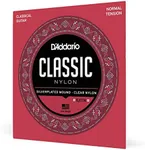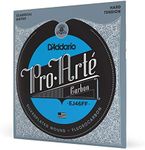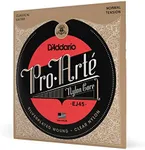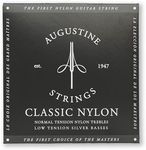Buying Guide for the Best Classical Guitar Strings
Choosing the right classical guitar strings can significantly impact your playing experience and the sound of your instrument. The strings you choose should complement your playing style, the type of music you play, and your guitar's characteristics. It's important to understand the different materials, tensions, and gauges available, as these factors will influence the tone, playability, and durability of the strings. By considering these aspects, you can find strings that enhance your performance and suit your personal preferences.MaterialClassical guitar strings are typically made from nylon, but there are variations such as clear nylon, rectified nylon, and composite materials. The material affects the tone and feel of the strings. Clear nylon strings offer a bright and clear sound, while rectified nylon provides a warmer tone with more texture. Composite strings, often used for the bass strings, can offer a more powerful and longer-lasting sound. When choosing the material, consider the type of music you play; for example, flamenco players might prefer brighter strings, while classical players might opt for warmer tones.
TensionString tension refers to how tight the strings are when tuned to pitch. It is usually categorized as low, medium, or high tension. Low tension strings are easier to play and produce a softer sound, making them suitable for beginners or those with a lighter touch. Medium tension strings offer a balance between playability and volume, making them a versatile choice for many players. High tension strings provide more volume and a brighter tone but require more finger strength to play. Choose the tension based on your playing style and the sound you wish to achieve.
GaugeThe gauge of a string refers to its thickness. In classical guitar strings, this is often less of a focus compared to tension, but it still plays a role in the feel and sound. Thicker strings can produce a fuller sound and are often more durable, while thinner strings are easier to play and can produce a brighter tone. Consider your playing style and comfort when choosing the gauge; if you prefer a softer touch, lighter gauges might be more suitable, whereas for a robust sound, heavier gauges could be the way to go.
CoatingSome classical guitar strings come with a coating that helps to extend their lifespan by protecting them from sweat and dirt. Coated strings can maintain their tone longer and are less prone to corrosion, making them a good choice for players who perform frequently or live in humid environments. However, some players feel that coated strings have a slightly different feel or sound compared to uncoated strings. If longevity and maintenance are important to you, consider trying coated strings to see if they meet your needs.
BrandDifferent brands offer various qualities and characteristics in their strings, and some players have strong preferences based on their experiences. While brand loyalty can be a factor, it's important to try different brands to find the one that best suits your guitar and playing style. Some brands are known for their bright tones, while others might be preferred for their durability or warmth. Experimenting with different brands can help you discover the strings that provide the best sound and feel for your instrument.

















